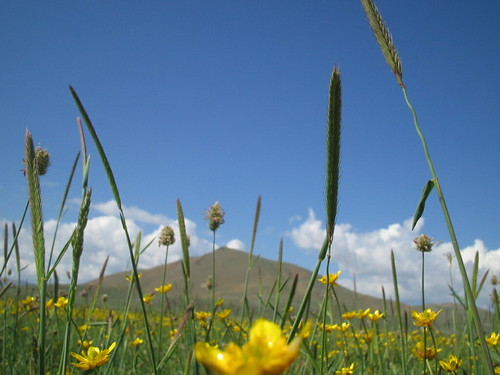As for the second point, I say what our faith says, and the truth of the matter. At a certain time a motion begins which is not precipitated by another motion and this occurs in this very manner: that there has been eternally a first mover, although there was not eternally a first moved; but at a certain time the first moved began, and then motion began.
—Albert of Saxony, Questions on the Physics (Questiones et decisiones physicales insignum virorum). Uche Ogbuji's translation. Latin original as follows:
Quantum ad secundum, dico quod secundum fidem nostram et rei veritatem. Aliquando incepit motus quem non precessit aliquis motus et hoc per istum modum quod eternaliter fuit primum motor, licet no eternaliter fuerit primum mobile; sed aliquando inceperit, et tunc incepit motus.
For some reason I've been sparring with the notion of the Prime Mover a lot this year. In my poems and other writings I've taken on the idea playfully, angrily, and sometimes in sheer bafflement. The idea comes from the tortured efforts to reconcile Platonism and Aristotelianism, received by medieval scholars with such reverence once re-discovered in contact with the Islamic civilizations, with Christian dogma. I think this struggle still dominates modern science and philosophy, though no serious enquirer outside the Bible Belt, except maybe Peter Geach, would dare plead directly to Christian principles in such discussion, and not many would directly invoke Aristotle. Despite this coyness a great deal of thinking behind Western civilization is bogged down in two theoretic systems which seem to betray utter ignorance of the natural world.

Albert of Saxony was one of those medieval natural philosophers instrumental in marrying Aristotle with St. Augustine; I believe I ran into his quote at the library of the University of Nigeria, Nsukka, and I managed to dig it up again in
God and reason in the Middle Ages by Edward Grant. As I've grown older I've become very sympathetic with Epicurianism, respectful of Sophism and hostile towards Socratism, the great enemy of both. Unfortunately Socratism won out in post-Classical times, with its insistence on impossible absolutes and false humility in style. I won't go so far as to claim that looking back more to Epicurus (who in turn looked back to Democritus, subject of savage attacks by Plato) would have prevented the religious distortions, cultural chauvanism and geopolitical distortion that characterize the West's material triumphs, but I do think Platonism served as a heavy, clumsy stick swung wildly about the world by Europe.
I must admit that it was not Plato and Aristotle who gave the Europeans that chilling formula "dico quod fidem nostram et rei veritatem", "according to faith and the truth of the matter," which so polluted Medieval natural philosophy with divinity studies. Ibn Rushd ("Averroës" in the West) had already compiled a herculean defence of Aristotle against some agents of Islamic dogma, having to cover much the same ground as Christians did centuries later. Since they were getting their Aristotle from the schools of Ibn Rushd, the Christian philosophers had to deal not only with the Greek, but also with the brilliant (though fundamentally flawed) elucidations of the Spanish Moor. In the end they pretty much just cut Ibn Rushd out with the neat scalpel of church dogma. Back to superstition square one. The dogma of six-day creation sixteen hundred years before the great flood could not withstand the empirical idea from the natural world that nothing suggests any beginning to the chain of causality. Things are in motion because things have always been in motion. The church needed to silence this heresy to make room for Yahweh and they did so with the garrotte rather than with fair debate.
The lasting effects of this strangulating threat occurred to me once again a few days ago when listening to Kool and the Gang's soaring, aching composition, "Who's Gonna Take the Weight." What lyrics there are to this song are eye opening:
People! The world today is in a very difficult situation,
And we all know it because we're the ones who created it;
We're gonna have to be the ones to clean it up;
We're gonna have to learn to live together
And love each other.
Because I believe one day someone or something
Is gonna wanna judge
Who's creating all this corruption and death and pollution,
All these difficult situations on earth.And he's gonna wanna know:
Who's gonna take the weight?
So the world is screwed up, and we're the ones who have to sort it out, but why? Not because it's our world to sort out, but because it's a world belonging to some Daddy Abstract hanging out in the sky who's going to come along some day to judge what we've done. What's the point of so much soul if all were doing is renting it, anyway?
Under the Aristotelian shadow of Ptolemy both Islamic and Christian natural philosophers wound themselves into ridiculous contortions until Copernicus and Galileo. The primum mobile, the first or empyrean sphere was equated to utter goodness in gratification of Christian doctrine and was accounted by Sacro Bosco in his seminal De Sphaera the only sphere of "motus rationalis" (i.e. rational motion by which they meant the rotation any idiot can see by observing the sun) and then by complete hocus-pocus the idea came about that all other spheres were of "motus irrationalis sive sensualis" ("irrational or sensual motion"; take that, Aristotle!). So now suddenly the church had not only the keys to goodness, but also to reason. How convenient!
Sadly, I'll close with one of the more lurid illustrations I've seen of how all this nonsense addled even the most brilliant minds in the West.
"Good-friday, 1613, Riding Westward"
by John Donne is a poem of his usual technical virtuosity, but is full of the sloppy, slavish sentiments that leave me so scornful.
LET man's soul be a sphere, and then, in this,
Th' intelligence that moves, devotion is ;
And as the other spheres, by being grown
Subject to foreign motion, lose their own,
And being by others hurried every day,
Scarce in a year their natural form obey ;
Pleasure or business, so, our souls admit
For their first mover, and are whirl'd by it.
Hence is't, that I am carried towards the west,
This day, when my soul's form bends to the East.
There I should see a Sun by rising set,
And by that setting endless day beget.
But that Christ on His cross did rise and fall,
Sin had eternally benighted all.
Yet dare I almost be glad, I do not see
That spectacle of too much weight for me.
Who sees Gods face, that is self-life, must die ;
What a death were it then to see God die ?
It made His own lieutenant, Nature, shrink,
It made His footstool crack, and the sun wink.
This is about the half-way point of the poem, and marks the heave of theme from a philosophical to a devotional bent. The church was all about facilitating such arcs, and The Dean of St. Pauls well illustrates how they got their wish for so long. I like to think the 21th century will mark another turning point in which we throw all that twaddle into the vaults of history, and actually look upon the universe with our own eyes. I personally have no truck with waiting out to determine Who's Gonna Take the Weight.



















